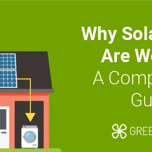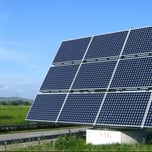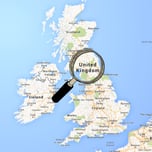Answer these simple questions and we will find you the BEST prices
Which type of solar quotes do you need?
It only takes 30 seconds
100% free with no obligation

Get up to 4 quotes by filling in only 1 quick form

Slash your energy bills by installing solar panels

For the average 2-3 bedroom house
- GreenMatch
- Blog
- Is My House Suitable For Solar Panels?
Is My House Suitable For Solar Panels? (October 2025)

Before going ahead with a solar panel installation, you must first check that the conditions a-top your roof meet some necessary requirements. To generate enough electricity for domestic use or to sell on through schemes such as the Smart Export Guarantee (SEG), you will need multiple panels. Therefore, you want to make sure your rooftop is sturdy and spacious enough for their installation and to withstand them long-term.
But it doesn’t end there, several other factors will also come into play. That’s why we’ve put together this guide that outlines these key checkmarks, so you know that your home is ready to go solar.
The benefits of switching to solar power are undeniable, from reducing your carbon footprint to saving money on your energy bills. If you're considering a solar panel installation, it's crucial to ensure that your home is suitable and what panels are best suited.
Our guide will help you determine if your roof meets the necessary requirements for a successful solar panel installation. When you're ready, request up to 3 solar panel quotes to compare and choose the best one. It all starts by clicking the button below and filling in a 30-second solar form.
- Quotes from local engineers
- Payment by finance available
- Save up to £1,567 per year
It only takes 30 seconds



Is My Roof Suitable for Solar Panels?
Solar panels’ position in relation to the sun, which includes the angle and the direction they face, must be carefully considered to ensure they are exposed to direct sunlight for as long as possible throughout the day.
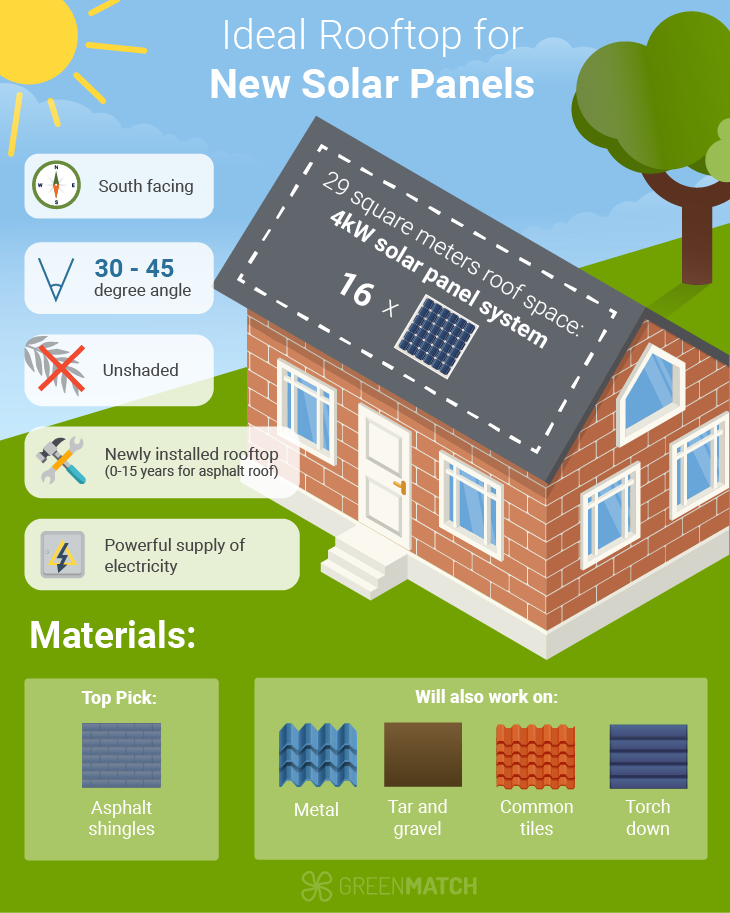
Your roof might not meet these specific requirements, but what’s most important is that your new solar panels can generate enough electricity to power your home, or a sizeable portion of it. It is also very possible to install flat roof solar panels and get a very high return. So not having the ideal roof pitch is not detrimental.
Improving your rooftop conditions will be key to ensuring a swift return on investment. Solar panel installers can advise you about ways to do this based on their professional assessments.
Tailored advice from local installers will be crucial since your location will play into the savings your system can bring you. For example, in Scotland and Northern England, there is less daylight during the winter months so you will want to make sure your new system can make the most out of the available sunlight by conditioning your rooftop accordingly.
How Do I Know If My Roof is Strong Enough For Solar Panels?
Any structural damage in your roof will have to be fixed up before installing a new solar panel system to ensure a smooth installation and so that it can support the new system overtime. The weight of solar panels should not adversely affect a well maintained roof. In fact, the panels might actually preserve it by providing shelter from natural wear and tear, such as from harsh weather conditions.
Although most roofs will last up to 40 years, the older the roof the less suitable it becomes for solar panel installation. This is because it will naturally deteriorate overtime and could be too weak to support a string of solar panels. Additionally, the weight of solar panels will depend on how many solar panels you need and the brand of the manufacturer.
Therefore, it’s important to have an estimation of how much your roof can withstand. As before, a professional installer can survey your roof's conditions and can recommend whether replacements, adjustments and repairs can be made first.
What’s the Best Roof Material for Solar Panels?
The most common rooftop materials can withstand a solar panel. However, these materials will each have different bearings on the cost of installation. Roofs made from wood are not suited to solar panels and installers will probably advise against it because of the increased risk of an electrical fire.
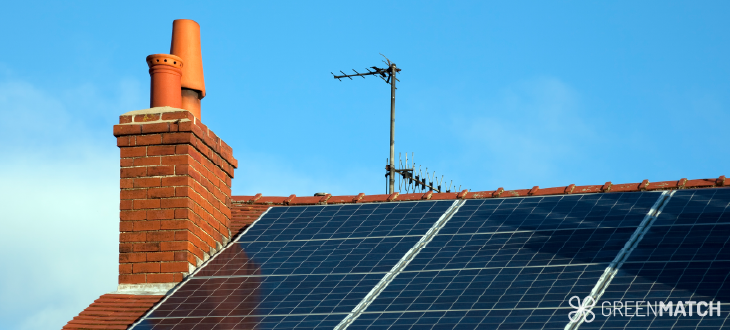
Asphalt Shingles
This is one of the most common types of roof material in the UK. This hardy, composite material is also the best option for solar panel installation. Solar panels can be easily secured by drilling holes through the shingles into the roof foundations to attach mounts that the solar panels will settle onto. Metal flashing will also cover the site around the drill holes to prevent leaks coming through the roof.
Metal
Metal roofs are also very compatible with solar panels and make for easy and fast installation. This long lasting, recycled material allows brackets to directly clamp to seams rather than having to drill through them, making them leak proof.
In particular, standing seams, which protrude from the edge of the flat metal panels, provide the added benefit of allowing the panels to tilt which increases their exposure to the sun throughout the year.
Tiles
These are also a common type of roof material across the UK, typically made from clay or concrete. They will last longer than composite shingles and are more resistant to leaks since they are fixed to the roof. However, installing a solar array onto this layout might be more costly given the complexity and risk involved.
That’s because these tiles are usually more brittle, especially those made from clay. Therefore, it’s not as simple as drilling through them, rather installers will have to remove the tiles and secure brackets to the rafters in the roof. The tiles are then placed back and rails can be connected to the brackets.
Tar and Gravel
This material is most prevalent in flat roofs. This will still be suitable for solar panels since these roofs are composed of layers of hot tar or gravel with layers of asphalt or roofing felt. This provides a sturdy foundation for solar panels.
Alternatively, the panels can be attached to cinder blocks which sit on the flat surface. However, the system will still require additional brackets so they can meet a 30-40 degree angle which adds to the overall costs.
Best Direction for Solar Panels in the UK
The orientation of your solar panels will directly affect how much electricity they are capable of producing. Although south facing solar panels, at 30-40 degrees is optimal in the UK to capture the most energy throughout the year, your system may still meet your electricity requirements if it faces another direction.
The angle of your panels is important since they need to be as perpendicular as possible to the light in order to operate most efficiently. This is where mounting systems come in to tilt the panels to meet the light. Otherwise, on especially steep roofs, the panels will have to be placed as flat to the roof as possible.
To further maximise your solar capacity, you can make adjustments to the angle of the panels based on the seasons. This is necessary since the sun is lower during the winter months and so to face it directly the panels would have to be positioned at a steeper angle (about 60 degrees) than in the summer months. This might not be necessary if your system is producing enough energy, especially if adjusting the angle makes the panels create shadows across them.
South Facing Solar Panels in the UK
If your roof faces south then it is primed for maximum solar power output, giving you the opportunity to electrify your home and generate an income.
You can make the most out of your solar system with a south facing roof since the panels will be in contact with the light throughout the day. Therefore, they can convert more energy than other directions. With this optimal power generation, your system could bring annual savings of up to £1,567, depending on the size if the system. More about this can be found in our 'are solar panels worth it?' guide.
Alongside selling off excess electricity to the local power grid, you could make back the costs of your solar system investment after 15 years. Installers will advise you about your home's specific potential. GreenMatch can help you with this by connecting you with up to 3 local installers who can make offers based on the scale of your solar installation.
- Quotes from local engineers
- Payment by finance available
- Save up to £1,567 per year
It only takes 30 seconds



East or West Facing Solar Panels in the UK
Since the sun rises and falls from east to west, such facing solar panels are still capable of generating enough power, depending on your consumption demands.
However, east and west facing systems will generate up to 20% less electricity than south facing panels and up to 10% if its a south-east or south-west facing system. This is almost full capacity and will potentially still meet a sizeable portion of your demands.
An installer might recommend a solar battery storage to back up your system and store the power it does generate at the optimal times for later use. Depending on the space on your roof, you may also want to consider additional panels to increase the power your system generates.
North Facing Solar Panels in the UK
In the UK, north facing rooftops are the worst possible option for solar panel orientation since they will face away from the sun. Your solar panel system would still save you money, but significantly less than alternative directions.
North facing panels could also complicate and prolong the installation process since the panels would require additional labour to mount them against the slant of the roof so they can capture some more light. In this case, you may instead want to consider a ground-mounted system.
Solar Panels on Shaded Roof
It’s important that your system remains unshaded throughout the day. Therefore, shaded rooftops or shadows cast from trees or neighbouring buildings will affect your home's overall suitability.
Your system will still operate under scattered or on and off shade but not at full capacity and it will damage their long term solar panel efficiency. What’s more, an entire system's output will be affected by a singular shaded cell.
But you shouldn’t lose hope just yet. You can bring in DC (direct current) optimisers which will re-balance the flow of energy through the rest of the panels by essentially bypassing the compromised panels. However, the costs and power output of optimisers themselves might outweigh their benefits. You should consult an installer to be sure of their worth to your system.
You can also choose to connect singular cell micro-inverters which convert the current of energy from a single cell, rather than all of them together as with typical string inverters. Therefore, each panel will operate independently and the panels unaffected by shade will operate at full capacity.
As mentioned throughout this guide, the best way to estimate your home's capacity to go solar is by consulting local installers who can make professional assessments. For example, a professional could guide you in the event of deciding to install solar panels in a conservation area.
That being said, you don’t want to miss out on any competitive prices, so be sure to compare rates from multiple local installers.
- Quotes from local engineers
- Payment by finance available
- Save up to £1,567 per year
It only takes 30 seconds



For a roundabout UK average 4kW installation, that’s a 2-3 person household, 16 250W panels would be required. These would require a surface area of 25.6 m².
In terms of angle and orientation, an unshaded south facing roof at a 30-40 degree angle will capture the most light throughout the day. Asphalt shingles are also most roof material to support a solar array, provided that the tiles are fairly new.
Most roofs in the UK will support solar panels. These include asphalt shingles, metal, tar and tiles of any kind. Wooden tiles are not suitable due to the associated fire safety risks. The condition and age of your roof is important to estimate before installation. Be sure to fix up or replace it if needed.
Solar panels have high upfront costs and saving from the Smart Export Guarantee might be low depending on the tariff you export to. They are also not suitable for all homes if you haven’t got the roof space to install enough panels that go a way to meeting your electricity demands.

Ciaran is a content writer at GreenMatch. Whether writing about sustainable aviation fuel or heat pumps, Ciaran has passion for informing readers about pivotal technologies that are reshaping our world.
We strive to connect our customers with the right product and supplier. Would you like to be part of GreenMatch?


